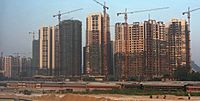
Photo from wikipedia
Food–energy–water (FEW) systems in the Bohai mega-urban region (MUR) have experienced astonishing changes in recent decades; however, the dynamics of these changes are not fully understood. This study combined an… Click to show full abstract
Food–energy–water (FEW) systems in the Bohai mega-urban region (MUR) have experienced astonishing changes in recent decades; however, the dynamics of these changes are not fully understood. This study combined an ecological multiscale input–output model and a structural decomposition analysis (SDA) to explore the variation in embodied FEW consumption and its drivers. The results showed that, although almost all sectoral embodied FEW intensities decreased, embodied FEW demands increased by approximately 9.9×108 tons, 4.61×107 TJ and 1.1×1011 m3 over 10-year period. The embodied FEW flow diagrams show that local consumption and trade were strengthened. Urban household consumption, fixed capital formation and exports were the main components affecting the embodied FEW use increases. An SDA revealed that the consumption level effect (∆c) was the dominant contributor that promoted the increase in the Bohai MUR’s embodied FEW consumption. The scale effect (∆p) also had a positive effect on the embodied FEW consumption increases. The technological effect (∆e) was the primary contributor to offset the embodied FEW consumption increase. The economic efficiency effect (∆L) and structural effect (∆sd) also contributed to offsetting the total embodied FEW consumption increase. The effect of the change in domestic and foreign imports (∆D and ∆F) impacted the increase in embodied FEW mainly through the change in the embodied FEW intensities and trade volumes. This study identified the changes in FEW systems and highlighted future coping strategies.
Journal Title: Environmental Science and Pollution Research
Year Published: 2022
Link to full text (if available)
Share on Social Media: Sign Up to like & get
recommendations!